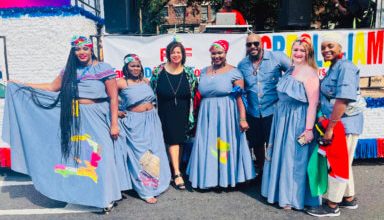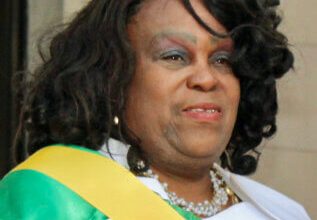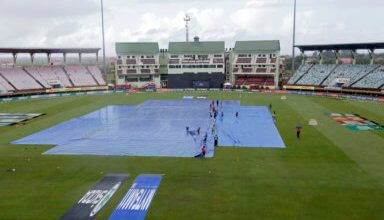Long, rough road ahead for full volcanic recovery in SVG: CB 17
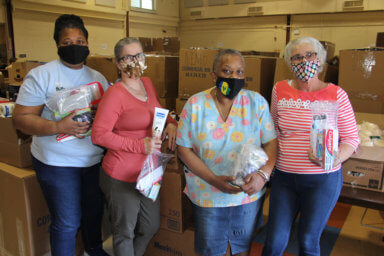
A community board in Brooklyn is warning that a long, rough road still lies ahead for St. Vincent and the Grenadines for full recovery from the explosive eruptions of La Soufrière volcano that ravaged the country.
That assessment was made by Community Board 17 that represents parts of East Flatbush and Flatbush, Brooklyn, based on a town hall meeting last Thursday, on the effects of the eruptions on St. Vincent and the Grenadines, hosted by members of the board’s Block Association Committee.
Victor Jordan — a Guyanese-born attorney and economist, who serves as 1st vice chairperson of Community Board 17 and whose late grandfather, Alexander Jordon, was born in Chateaubelair, a town along the northwestern coast of St. Vincent and the Grenadines and within the red zone of La Soufrière volcano — told Caribbean Life Wednesday that he moderated the town hall.
He said the presenters were Prof. Compton Bourne, former president of the Caribbean Development Bank (CDB) and erstwhile principal of the University of the West Indies, St. Augustine Campus, Trinidad & Tobago; and Lou-Ann Gilchrist, St. Vincent and the Grenadines’ Ambassador to the United States and the Organization of American States (OAS).
“Amb. Gilchrist itemized many of the challenges that St. Vincent (and the Grenadines) is facing, as it tries to bring daily life of people and the economy back to normal in the aftermath of the eruption of the La Soufrière volcano,” said Jordan, an Adjunct Professor in Economics at Brooklyn College.
“Some of the residents from the orange zone have been allowed to return,” he added. “However, the ambassador suggests that the devastation in the red zone may be so severe that people may not be able to return in the foreseeable future. If the red zone is declared inhabitable, then thousands of people will be without homes.
“The eruption of the volcano has destroyed many of the roads in the affected areas and also damaged bridges,” Jordan continued. “As a result, certain parts of St. Vincent (and the Grenadines) remain impassable, which is frustrating relief and rebuilding efforts.”
Currently, Jordan said there is “a pressing need for six-wheeler type trucks that would allow relief efforts to continue in areas hardest hit by the volcano’s eruptions.”
In addition, he said some areas hit by the volcano may not be accessible to Vincentians in a long time to come.
In terms of health care, Jordan said Gilchrist noted that some equipment had to be removed from hospitals in the affect zones to prevent further damage by the emission of ashes and other debris.
“This has disrupted the treatment of people who are on dialysis or receiving other treatment from hospital equipment,” he said. “People (are) now required to wait for long periods of time before getting access to life-saving treatment.”
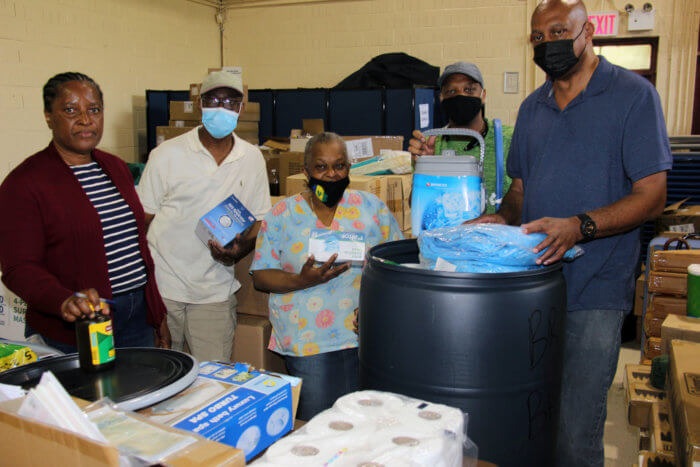
Jordan said the ashes spewed by the volcano have also contaminated the air in St. Vincent and the Grenadines, stating, however, that it is still unclear what effects the ashes will have on the respiratory system of nationals.
He said there is an immediate need to test the air quality in the country “to see exactly what corrective measures could be taken to protect the health of people who cannot leave to go somewhere else.”
In addition, Jordan said there is an even bigger question: “That is what is the correct way to disposes of the ashes. Is it safe to dispose of the ashes into the sea?
“Do we know what effect the ashes will have on the fishes and ecosystem in St. Vincent and the Grenadines’ sea resources?” he asked.
Prior to the eruption of the La Soufrière volcano, the government was finally getting a handle on the COVID-19 pandemic, Jordan said.
“However, now, the ambassador noted there is a spike in the infection rates in the emergency shelters, which is due to the crammed quarters of the facilities,” he said, stating that these emergency shelters had to be set up to accommodate 20,000 people, who were evacuated from the red zone.
“Because of some resistance to testing and vaccination, there is some concern that there could be a greater spike in infections in the shelters and eventually in the whole country,” Jordan added.
He said that Bourne, who is no stranger to the challenges that small countries face in getting their “house in order” after a natural disaster, indicated that St. Vincent and the Grenadines faces “a hard road ahead”.
“Unfortunately, because the disaster in St. Vincent (and the Grenadines) has still not captured worldwide media attention, it will not attract the resources that are needed to put it back on the path to development,” Jordan said.
“He is not very optimistic that the World Bank, the Caribbean Development Bank and other international lending agencies will be inclined to provide all the funding that St. Vincent and the Grenadines will need to return to normal, and rebuild the St. Vincent (and the Grenadines) economy,” he added.
Jordan said Bourne suggested that he did not even see the possibility of international lending institutions waiving St. Vincent and the Grenadines’ international loan obligations, or even reducing the terms of payment of these loans.
“The challenge for St. Vincent (and the Grenadines) and its supporters is to ‘hammer in’ the urgency of the situation and also to point out the double standard in aiding some counties and not aiding others,” Jordan said.
He said Bourne noted that a large portion of the economy of St. Vincent and the Grenadines has been shut down, and that the government has provided some assistance to some farmers, but added that “the vast majority of workers in St. Vincent and the Grenadines remain with little or nothing.”
“Unfortunately, residents of St. Vincent (and the Grenadines) do not have access to the type of stimulus payments, unemployment benefits, PPP loans, and EIDL that are available to residents and businesses in the United States,” Jordan said.
“We urge everyone to contact their congressional representatives, including their US senator, and request that they write letters to Alejandro Mayorkas, Secretary of Homeland Security, and request that St. Vincent and the Grenadines be granted Temporary Protective Status (TPS) until things return to normal in St. Vincent and the Grenadines,” he added, advising that, in New York, “the key senator that letters to be written to is Sen. Charles Schumer, who is now the leader in the US Senate.”
Last month, Community Board 17 passed a resolution supporting a call by Caribbean American Democratic Congresswoman Yvette D. Clarke appealing to the Joe Biden administration to grant TPS to Vincentians in the red zone of the explosive La Soufrière volcano.
Clarke who represents the predominantly Caribbean 9th Congressional District in Brooklyn first raised the issue after visiting the principal volcano relief center, at the Friends of Crown Heights Educational Center in Brooklyn, run by the Brooklyn-based SVG Relief Committee, USA, Inc.
Meantime, Verna Arthur, chairperson on SVG Relief Committee, USA, Inc. told Caribbean Life on Wednesday that “our relief effort continues with the cleaning/recovery phase.”
She said some of the items needed now are: scrubbing brooms, rakes, forks, goggles, water boots (sizes 9-12), buckets, mops and power washers.
Arthur said the committee is no longer collecting water or clothing.
She urged that the public contact any the following executive members if making a contribution or donation: O’Brien Simmons (347) 446-1827; Atiba Williams (347) 898-7501; Arthur (718) 758-2416; or Laverne McDowald-Thompson (347) 385-6227.


